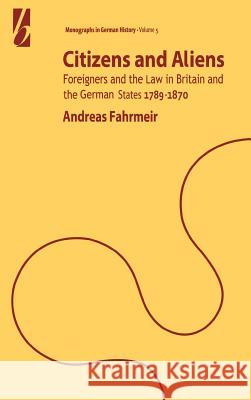Citizens and Aliens: Foreigners and the Law in Britain and German States 1789-1870 » książka
Citizens and Aliens: Foreigners and the Law in Britain and German States 1789-1870
ISBN-13: 9781571817174 / Angielski / Twarda / 2000 / 304 str.
Citizens and Aliens: Foreigners and the Law in Britain and German States 1789-1870
ISBN-13: 9781571817174 / Angielski / Twarda / 2000 / 304 str.
(netto: 482,14 VAT: 5%)
Najniższa cena z 30 dni: 498,70
ok. 30 dni roboczych
Bez gwarancji dostawy przed świętami
Darmowa dostawa!
"Fahrmeir's lucid and valuable study thus establishes not only that German conceptions and systems of citizenship predate the victory of German nationalist (and nativist) thought, but also that, despite the greater liberality of the British system in most respects, the German regime had many attributes more liberal than the British...Fahrmeir strikes a telling and persuasive blow for the "modernit" account of nationalism against the "primordialists.."" - Central European History ..". a] truly comparative ... lucid and valuable study ... By virtue of his scrupulous and searching exploration of the 'in-between' era in which citizenship regimes emerged, Fahrmeir strikes a telling and persuasive blow to the 'modernist' account of nationalism against the 'primordialist'." - Central European History "His pathbreaking book reflects a significant amount of original scholarly research, and clarifies a large number of previously poorly illuminated questions and relationships." - H-German " A] pioneering study ... As well as its empirical strengths, the book also demonstrates Fahrmeir's comfort in dealing with theory ... The rigor with which he] tackles his subject deserves comment ... A genuine comparative history ... an extremely important monograph ... a major contribution to out understanding of the legal position of aliens in modern European history." - American Historical Review ..". concisely written ... excellently researched." - Frankfurter Allgemeine Zeitung "Future students of issues such as citizenship, naturalization, extradition etc] have in Fahrmeir's book a model of the even-handed approach required." - The International History Review "Fahrmeir's carefully argued and detailed study ... should be read by anybody who is interested in the current debate on nationality and migration." - H-NET Liste fuer Sozial- und Kulturgeschichte From the last decade of the 18th century, European states began to define nationality more rigorously. Regulations covering matters as diverse as passports, residence permits, taxes, and admission to university examinations made clear that nationality mattered more than rank. Drawing on the files of central and regional administrations and on individual case studies and travel accounts, the author offers a detailed examination of the practical consequences of alien status in liberal England and in the comparatively restrictive German states. In the latter all citizens of other German states were considered foreigners, whereas in the United Kingdom Irish immigrants were by law British subjects along with all other persons born on British soil. These differences in legal definition of citizenship should have far-reaching consequences for the development of modern nation states, consequences the effects of which can be felt to this day.
“Fahrmeir’s lucid and valuable study thus establishes not only that German conceptions and systems of citizenship predate the victory of German nationalist (and nativist) thought, but also that, despite the greater liberality of the British system in most respects, the German regime had many attributes more liberal than the British…Fahrmeir strikes a telling and persuasive blow for the “modernit” account of nationalism against the “primordialists.”." · Central European History"... [a] truly comparative ... lucid and valuable study ... By virtue of his scrupulous and searching exploration of the 'in-between' era in which citizenship regimes emerged, Fahrmeir strikes a telling and persuasive blow to the 'modernist' account of nationalism against the 'primordialist'." · Central European History"His pathbreaking book reflects a significant amount of original scholarly research, and clarifies a large number of previously poorly illuminated questions and relationships." · H-German"[A] pioneering study ... As well as its empirical strengths, the book also demonstrates Fahrmeir's comfort in dealing with theory ... The rigor with which [he] tackles his subject deserves comment ... A genuine comparative history ... an extremely important monograph ... a major contribution to out understanding of the legal position of aliens in modern European history." · American Historical Review"... concisely written ... excellently researched." · Frankfurter Allgemeine Zeitung"Future students of issues [such as citizenship, naturalization, extradition etc] have in Fahrmeir's book a model of the even-handed approach required." · The International History Review"Fahrmeir's carefully argued and detailed study ... should be read by anybody who is interested in the current debate on nationality and migration." · H-NET Liste fuer Sozial- und KulturgeschichteFrom the last decade of the 18th century, European states began to define nationality more rigorously. Regulations covering matters as diverse as passports, residence permits, taxes, and admission to university examinations made clear that nationality mattered more than rank. Drawing on the files of central and regional administrations and on individual case studies and travel accounts, the author offers a detailed examination of the practical consequences of alien status in liberal England and in the comparatively restrictive German states. In the latter all citizens of other German states were considered foreigners, whereas in the United Kingdom Irish immigrants were by law British subjects along with all other persons born on British soil. These differences in legal definition of citizenship should have far-reaching consequences for the development of modern nation states, consequences the effects of which can be felt to this day.











